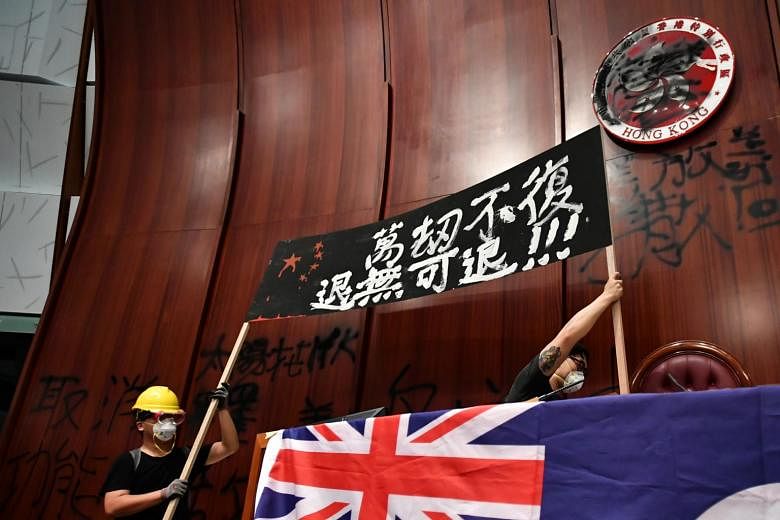HONG KONG - In a move that could add fuel to existing tensions between Taiwan and China, Taiwan said it will consider granting asylum to protesters from Hong Kong based on humanitarian concerns.
Thirty Hong Kong protesters who stormed the city's Legislative Council (LegCo) on July 1 have reportedly arrived in Taiwan to seek asylum, Hong Kong's Apple Daily newspaper reported, while at least 30 others are planning to try soon.
Without confirming whether any asylum requests had been received, Taiwan's top policymaking body on China, the Mainland Affairs Council, said it would handle such cases "under the principle of respecting human rights protections and humanitarian concerns".
Taiwanese President Tsai Ing-wen, a China critic who is up for re-election in January, offered her support during a diplomatic visit to the Caribbean late on Thursday (July 18), the state-run Central News Agency reported on Friday.
"These friends from Hong Kong will be treated in an appropriate way on humanitarian grounds," Taiwan's Central News Agency quoted her as saying during a visit to the Saint Lucia.
However, the move would be fraught with geopolitical risks as it threatens to raise tensions between the administration of Ms Tsai and Chinese President Xi Jinping, who has already faced embarrassment over the international attention paid to Hong Kong's anti-government protests.
Chinese Foreign Ministry spokesman Geng Shuang said during a Friday briefing: "My advice to certain people on the island is, don't pretend to be compassionate. They can't even protect themselves, what more other people?"
Hong Kong's unprecedented demonstrations over amendments to an existing extradition law - that would allow suspects to be sent from Hong Kong to the mainland for the first time - have struck a chord with democratically run Taiwan, which China considers a renegade province.
The Taiwan Association for Human Rights, a top local non-governmental organisation, would not comment on the asylum cases.
"We cannot divulge any information regarding any individual case," said its secretary-general Chiu E-ling. "If there are individuals who approach us for help, we'll interview these people and help them get in touch with government officials if that is what they wish."
Embattled Hong Kong leader Carrie Lam, who has been keeping a low profile, had condemned the protesters' "extreme use of violence and vandalism".
She also supported the police's decision to retreat from the LegCo during mass protests on July 1.
The day marked the 22nd anniversary of Britain's handover of Hong Kong back to China in 1997.
Pro-Beijing lawmaker Regina Ip warned that relations between Hong Kong and Taipei could sour, adding that such a move by Taiwan sends a clear message that it harbours criminals.
She singled out prominent protester Brian Leung as an example, urging the authorities to track down the former Hong Kong University school magazine editor who is remembered for removing his mask in front of a camera while storming the LegCo complex. He has reportedly fled Hong Kong.
Associate Professor Dixon Sing, of the Hong Kong University of Science and Technology, said that he believes Ms Tsai's comments highlight the implication that "Hong Kong has been treated as a very repressive system under the so-called 'one country, two systems' (principle)".
Given that her decision came after the European Parliament's move on Thursday to tighten export controls and deny Hong Kong technologies that could be used to violate human rights, he said the city's international reputation has taken a beating.
"This would put more pressure on both Beijing and Hong Kong government in (terms of) the repertoire of tactics they can launch against the protesters," he said.
"The more repressive they are, the more the international community will condemn or consider Hong Kong as having become a more repressive political system."











